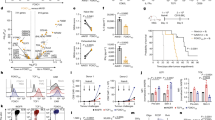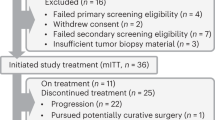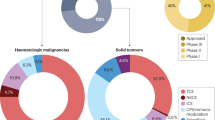Abstract
Interleukin 23 (IL-23) is a member of the IL-12 family of heterodimeric cytokines, composed of p19 and p40 subunits, which exhibits immunostimulatory properties similar to IL-12. IL-23 has been shown to possess potent antitumor activities in several establishment models of cancer and a few therapeutic models, but the efficacy of local, adenoviral-mediated expression of IL-23 in established tumors has yet to be investigated. Here we have examined the antitumor activity of adenovirally delivered IL-23 in a day-7 MCA205 murine fibrosarcoma tumor model. Three intratumoral injections of adenovirus expressing IL-23 (Ad.IL-23) significantly increased animal survival and resulted in complete rejection of 40% of tumors, with subsequent generation of protective immunity and MCA205-specific cytotoxic T lymphocytes. In addition, we have shown that the antitumor activity of IL-23 is independent of IL-17, perforin and Fas ligand, but dependent on interferon-γ, CD4+ and CD8+ T cells. These results demonstrate that direct intratumoral injection of adenovirus expressing IL-23 results in enhanced survival, tumor eradication and generation of protective immunity by generation of a Th1-type immune response.
This is a preview of subscription content, access via your institution
Access options
Subscribe to this journal
Receive 12 print issues and online access
$259.00 per year
only $21.58 per issue
Buy this article
- Purchase on Springer Link
- Instant access to full article PDF
Prices may be subject to local taxes which are calculated during checkout






Similar content being viewed by others
References
Oppmann B, Lesley R, Blom B, Timans JC, Xu Y, Hunte B et al. Novel p19 protein engages IL-12p40 to form a cytokine, IL-23, with biological activities similar as well as distinct from IL-12. Immunity 2000; 13: 715–725.
Parham C, Chirica M, Timans J, Vaisberg E, Travis M, Cheung J et al. A receptor for the heterodimeric cytokine IL-23 is composed of IL-12Rbeta1 and a novel cytokine receptor subunit, IL-23R. J Immunol 2002; 168: 5699–5708.
Belladonna ML, Renauld JC, Bianchi R, Vacca C, Fallarino F, Orabona C et al. IL-23 and IL-12 have overlapping, but distinct, effects on murine dendritic cells. J Immunol 2002; 168: 5448–5454.
Aggarwal S, Ghilardi N, Xie MH, de Sauvage FJ, Gurney AL . Interleukin-23 promotes a distinct CD4 T cell activation state characterized by the production of interleukin-17. J Biol Chem 2003; 278: 1910–1914.
Lo CH, Lee SC, Wu PY, Pan WY, Su J, Cheng CW et al. Antitumor and antimetastatic activity of IL-23. J Immunol 2003; 171: 600–607.
Shan B, Yu L, Shimozato O, Li Q, Tagawa M . Expression of interleukin-21 and -23 in human esophageal tumors produced antitumor effects in nude mice. Anticancer Res 2004; 24: 79–82.
Shan BE, Hao JS, Li QX, Tagawa M . Antitumor activity and immune enhancement of murine interleukin-23 expressed in murine colon carcinoma cells. Cell Mol Immunol 2006; 3: 47–52.
Ugai S, Shimozato O, Yu L, Wang YQ, Kawamura K, Yamamoto H et al. Transduction of the IL-21 and IL-23 genes in human pancreatic carcinoma cells produces natural killer cell-dependent and -independent antitumor effects. Cancer Gene Ther 2003; 10: 771–778.
Wang YQ, Ugai S, Shimozato O, Yu L, Kawamura K, Yamamoto H et al. Induction of systemic immunity by expression of interleukin-23 in murine colon carcinoma cells. Int J Cancer 2003; 105: 820–824.
Kaiga T, Sato M, Kaneda H, Iwakura Y, Takayama T, Tahara H et al. Systemic administration of IL-23 induces potent antitumor immunity primarily mediated through Th1-type response in association with the endogenously expressed IL-12. J Immunol 2007; 178: 7571–7580.
Hu J, Yuan X, Belladonna ML, Ong JM, Wachsmann-Hogiu S, Farkas DL et al. Induction of potent antitumor immunity by intratumoral injection of interleukin 23-transduced dendritic cells. Cancer Res 2006; 66: 8887–8896.
Happel KI, Zheng M, Young E, Quinton LJ, Lockhart E, Ramsay AJ et al. Cutting edge: roles of Toll-like receptor 4 and IL-23 in IL-17 expression in response to Klebsiella pneumoniae infection. J Immunol 2003; 170: 4432–4436.
Bilbao R, Reay DP, Hughes T, Biermann V, Volpers C, Goldberg L et al. Fetal muscle gene transfer is not enhanced by an RGD capsid modification to high-capacity adenoviral vectors. Gene Therapy 2003; 10: 1821–1829.
Ye P, Rodriguez FH, Kanaly S, Stocking KL, Schurr J, Schwarzenberger P et al. Requirement of interleukin 17 receptor signaling for lung CXC chemokine and granulocyte colony-stimulating factor expression, neutrophil recruitment, and host defense. J Exp Med 2001; 194: 519–527.
Lockhart E, Green AM, Flynn JL . IL-17 production is dominated by gammadelta T cells rather than CD4 T cells during Mycobacterium tuberculosis infection. J Immunol 2006; 177: 4662–4669.
Langrish CL, Chen Y, Blumenschein WM, Mattson J, Basham B, Sedgwick JD et al. IL-23 drives a pathogenic T cell population that induces autoimmune inflammation. J Exp Med 2005; 201: 233–240.
Benchetrit F, Ciree A, Vives V, Warnier G, Gey A, Sautes-Fridman C et al. Interleukin-17 inhibits tumor cell growth by means of a T-cell-dependent mechanism. Blood 2002; 99: 2114–2121.
Edelstein ML, Abedi MR, Wixon J . Gene therapy clinical trials worldwide to 2007—an update. J Gene Med 2007; 9: 833–842.
Brunda MJ, Luistro L, Warrier RR, Wright RB, Hubbard BR, Murphy M et al. Antitumor and antimetastatic activity of interleukin 12 against murine tumors. J Exp Med 1993; 178: 1223–1230.
Noguchi Y, Jungbluth A, Richards EC, Old LJ . Effect of interleukin 12 on tumor induction by 3-methylcholanthrene. Proc Natl Acad Sci USA 1996; 93: 11798–11801.
Nanni P, Nicoletti G, De Giovanni C, Landuzzi L, Di Carlo E, Cavallo F et al. Combined allogeneic tumor cell vaccination and systemic interleukin 12 prevents mammary carcinogenesis in HER-2/neu transgenic mice. J Exp Med 2001; 194: 1195–1205.
Colombo MP, Trinchieri G . Interleukin-12 in anti-tumor immunity and immunotherapy. Cytokine Growth Factor Rev 2002; 13: 155–168.
McKenzie BS, Kastelein RA, Cua DJ . Understanding the IL-23-IL-17 immune pathway. Trends Immunol 2006; 27: 17–23.
Langowski JL, Kastelein RA, Oft M . Swords into plowshares: IL-23 repurposes tumor immune surveillance. Trends Immunol 2007; 28: 207–212.
Jin HT, Youn JI, Choi SY, Seo SH, Park SH, Song MY et al. Adenovirus-mediated gene transfer of interleukin-23 shows prophylactic but not therapeutic antitumor effects. Cancer Gene Ther 2008; 15: 693–702.
Acknowledgements
This work was supported by grant CA100327 from the NIH.
Author information
Authors and Affiliations
Corresponding author
Rights and permissions
About this article
Cite this article
Reay, J., Kim, SH., Lockhart, E. et al. Adenoviral-mediated, intratumor gene transfer of interleukin 23 induces a therapeutic antitumor response. Cancer Gene Ther 16, 776–785 (2009). https://doi.org/10.1038/cgt.2009.27
Received:
Revised:
Accepted:
Published:
Issue Date:
DOI: https://doi.org/10.1038/cgt.2009.27
Keywords
This article is cited by
-
IL23 and TGF-ß diminish macrophage associated metastasis in pancreatic carcinoma
Scientific Reports (2018)
-
IL-23 promotes TCR-mediated negative selection of thymocytes through the upregulation of IL-23 receptor and RORγt
Nature Communications (2014)
-
Ultrasound-guided intra-tumor injection of combined immunotherapy cures mice from orthotopic prostate cancer
Cancer Immunology, Immunotherapy (2013)
-
Intratumoral delivery of CD154 homolog (Ad-ISF35) induces tumor regression: analysis of vector biodistribution, persistence and gene expression
Cancer Gene Therapy (2012)
-
The antitumor effects of adenoviral-mediated, intratumoral delivery of interleukin 23 require endogenous IL-12
Cancer Gene Therapy (2012)



